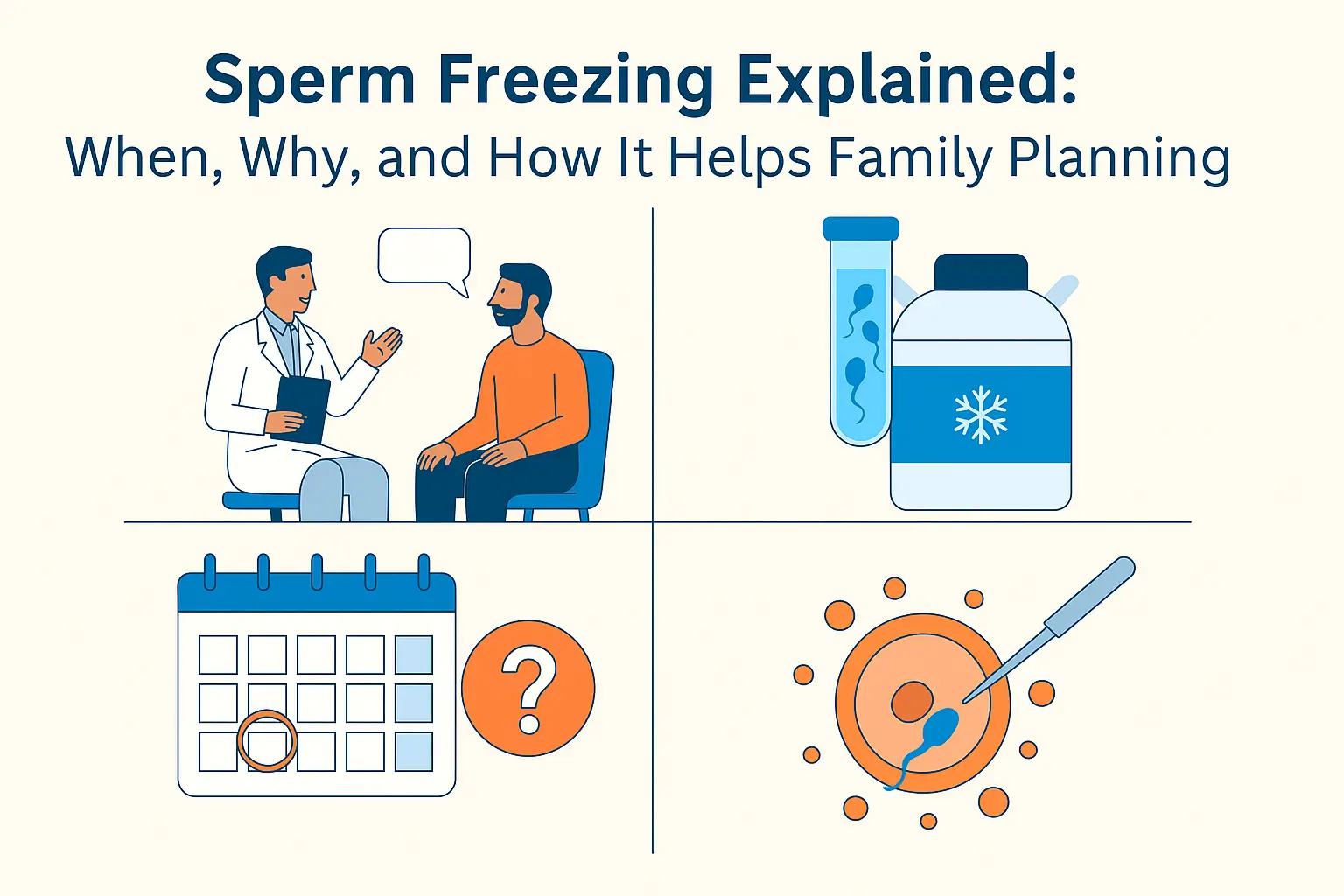-
Sperm Freezing Explained: When, Why, and How It Helps Family Planning
Sperm Freezing Explained: When, Why, and How It Helps Family Planning
In today’s era of personalized healthcare and flexible lifestyle choices, fertility preservation is becoming an essential part of family planning. This medical technique allows men to preserve their fertility by collecting and freezing sperm for future use. Once reserved for a narrow range of medical needs, sperm freezing is now embraced by individuals for various […]

In today’s era of personalized healthcare and flexible lifestyle choices, fertility preservation is becoming an essential part of family planning. This medical technique allows men to preserve their fertility by collecting and freezing sperm for future use. Once reserved for a narrow range of medical needs, sperm freezing is now embraced by individuals for various personal, professional, and health-related reasons.
This blog explores what sperm freezing is, when it's recommended, how the process works, and why it's a smart option for many men today.
What Is Sperm Freezing?
Sperm freezing involves collecting a semen sample, processing it with a protective solution, and storing it at extremely low temperatures using liquid nitrogen (−196°C). At this temperature, sperm cells can remain viable for years or even decades. When a man decides to start a family, the sperm can be thawed and used in assisted reproductive technologies (ART) such as intrauterine insemination (IUI), in-vitro fertilization (IVF), or intracytoplasmic sperm injection (ICSI).
This method offers an opportunity to safeguard fertility regardless of age, health condition, or life circumstance.
When Should Sperm Freezing Be Considered?
While some may freeze sperm out of medical necessity, many do so as a proactive lifestyle choice. Common reasons include:
1. Before Cancer or Medical Treatments
Treatments like chemotherapy, radiation, and certain surgeries can damage sperm production. Men undergoing these treatments often freeze sperm in advance to preserve their reproductive potential.
2. Age and Fertility Decline
Though men can technically father children later in life, studies show sperm quality declines with age, affecting motility, morphology, and DNA integrity. Freezing sperm in one’s 20s or 30s may increase the chances of future success with ART.
3. High-Risk Jobs or Military Service
Men working in hazardous environments—like soldiers, firefighters, or those exposed to chemicals—may choose sperm freezing in case of injury or exposure that could impact fertility.
4. Gender Transitioning
Transgender women (assigned male at birth) planning to start hormone replacement therapy (HRT) or undergo gender-affirming surgery may lose sperm production permanently. Freezing sperm in advance secures the chance to conceive biologically at a later stage.
5. Before Vasectomy
Some men choose to freeze sperm before getting a vasectomy, offering a safety net in case they later change their mind about having children.
6. Delayed Parenthood
More men are postponing fatherhood due to education, career goals, or personal timing. Sperm freezing ensures they can have children when the time is right, even if fertility decreases later in life.
How Does the Sperm Freezing Process Work?
The process of sperm freezing is simple and generally includes a few key steps, each designed to ensure the sperm remains healthy and viable for future use.
1. Initial Consultation
A fertility specialist will assess medical history, explain the procedure, and recommend preliminary tests, including screenings for infectious diseases like HIV and Hepatitis B/C.
2. Semen Collection
Typically, the semen sample is obtained through self-stimulation in a private setting at the clinic. To improve the sample’s quality, men are advised to abstain from ejaculation for 2–5 days beforehand. In rare cases where ejaculation isn't possible, surgical methods like testicular sperm extraction (TESE) may be used.
3. Semen Analysis
The sample is examined for:
- Sperm count
- Motility (movement)
- Morphology (shape)
- Volume and pH
This determines the sample’s suitability for freezing and the number of vials that can be stored.
4. Cryopreservation
Sperm are preserved more effectively by mixing the semen with a cryoprotectant before freezing. It is then cooled gradually and stored in vials inside liquid nitrogen tanks at ultra-low temperatures.
How Long Can Sperm Stay Frozen?
There’s no strict time limit on how long sperm can remain frozen. Scientific findings confirm that sperm frozen for over 20 years remains capable of fertilization. Most clinics recommend regular consent renewals and storage fees for continued preservation. As long as the sperm remains in a secure, monitored environment, it can potentially be used decades later with excellent outcomes.
Success Rates with Frozen Sperm
While frozen sperm can be slightly less motile after thawing, the success rates with ART procedures remain high—especially with IVF or ICSI. Factors influencing success include:
- The original quality of the sperm
- The woman’s age and fertility status
- The method of reproductive technology used
In cases of poor sperm motility, ICSI is often advised because it involves injecting an individual sperm directly into the egg to facilitate fertilization.
Emotional and Lifestyle Benefits
Beyond its medical value, sperm freezing provides emotional security and flexibility. It can:
- Reduce stress for men facing major medical treatments
- Allow people undergoing gender transition to preserve reproductive options
- Help couples delay starting a family without fertility pressure
- Empower single men to plan parenthood independently
Ultimately, it offers men peace of mind that they’ve preserved an important part of their future.
Conclusion
Sperm freezing is an effective and increasingly popular tool in modern fertility care. Whether due to medical reasons, future goals, or personal changes, sperm freezing empowers men to safeguard and prolong their fertility window. As awareness and acceptance of fertility preservation grows, more men are seeing cryopreservation not just as a backup plan—but as a smart, empowering step in taking control of their future.